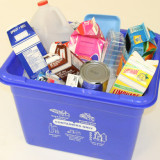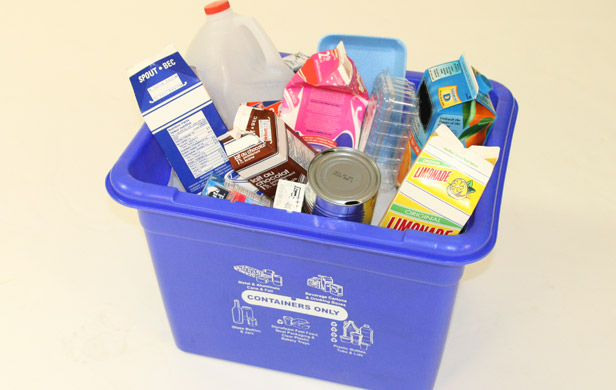By Steven Chua, The Canadian Press
VANCOUVER – The B.C. government’s controversial new recycling program took effect Monday, irking some local business owners who say that additional costs will drive up the price of consumer goods.
The new regulations require that all businesses that supply packaging and printed paper to B.C. residential customers be responsible for collecting and recycling the material once customers are done with it.
Anita Huberman, CEO of the Surrey Board of Trade, says this will create additional costs for businesses, which will pass the extra expenses onto consumers.
“Producers will be adding costs to food, newspapers, and other things distributed to retailers, then retailers will extend their traditional markup to consumers,” wrote Huberman in an email. “This additional cost will make them less competitive with competitors from other provinces and countries.”
[quote]In Ontario, cardboard is being charged at eight cents a kilogram while in B.C. this program is at 29 cents a kilogram — this is huge.[/quote]
Huberman says that B.C.’s recycling fees should be reduced to match those in Ontario.
MMBC says it’s addressing concerns
However, the director of the non-profit organization overseeing the new recycling program on behalf of 940 companies says the increased costs from the new rules would only hurt small businesses, who are generally exempt from the new regulations anyway.
“I think the exemptions that have been announced by the government address many of the concerns with respect to small business,” said Allan Langdon of Multi-Material BC in an interview.
He says businesses that either make less than $1 million in sales, produce less than 1,000 kilograms of print and packaging or businesses that do not operate as a chain or franchise are exempt from the new program.
“From our perspective that’s really taken away the impact on the kind of small businesses that maybe have had a problem with the administration or costs,” he said.
3,000 businesses affected
Langdon says up to 3,000 corporations are affected by the new regulations and those companies who are not signed onto Multi-Material BC will have to co-ordinate their own recycling efforts.
About 1.25 million households started receiving service from the non-profit organization as of Monday, he said.
In municipalities where there are already recycling trucks, Multi-Material BC has offered cash incentives to help foot the bill, while some areas that don’t have curbside service will be seeing pickups for the first time.
Collection services for the North Okanagan, the Trail area, Rossland, the Castlegar area, Coquitlam, Anmore, Prince George and Quesnel will be phased in during the next few months starting Monday, Langdon said.
For consumers who are already putting out their recycling bins, perhaps the most noticeable change will be that some municipalities will be asking their residents to separate glass from other recycled goods.
Langley, Richmond and possibly Burnaby will implement separate glass collection bins, Langdon said.
This will prevent glass from being shattered and contaminated, which ensures that it will get recycled, he said.
The change is being implemented because Multi-Material BC is required to measure how much material is recycled — not just how much is picked up, he said.
READ: Economist: BC’s private waste, recycling plan is garbage



What a load of BS that business ‘passes it on to consumers’. I’ve been it business for myself for 32 years. You charge what the market will bear. If my costs go up, I can’t necessarily increase my prices. I may have to live with less profit. Likewise, if costs go down, such as through reduced taxes, I never ‘pass those on’. Give me a break. I pocket them!
Recycling everything is possible.
If people were’nt so inherently lazy.
I have said it before and I will say it again.
If it isnt easy, people wont do it. That simple.
I challenge anyone to place 4 bins( Garbage, Glass, Metal, Plastic) outside ANY public space and view the results 24 hours later……..
Seriously, it doesnt get much easier than walking up to a row of bins as you enter or exit a building, a park, etc.
All the anonymous public( more on this later) have to do is choose which bin to drop their item into.
My prediction.
The bin closest to the majority of people walking by will get 80% of ………..everything.
People talk about the environment but when it comes right down to it.
Most of us are lazy slobs.
In Germany, Volkswagen has gone so far as recycle 100% of an old car.
http://www.google.ca/url?sa=t&rct=j&q=&esrc=s&frm=1&source=web&cd=4&cad=rja&uact=8&ved=0CFsQtwIwAw&url=http%3A%2F%2Fwww.youtube.com%2Fwatch%3Fv%3DUBxKkoe2L08&ei=_LyAU_qhDI33oATH34DQCA&usg=AFQjCNFiBQTjzDsIK_WQn5jJVj_DD09k9w
But even after viewing that video, I’m sure there are hundreds of derelict Volkswagons dotting the German countryside. Furtively parked and abandoned when no one is watching.
We can legislate ourselves to death with these new “fees” or “fines” but when it comes right down to it.
If people can dump recycled items in the garbage with no feelings of remorse because no one else will notice. They will do it every time.
Oh, and just watch out if you point out to someone that they dropped a recycleable item in a garbage bin.
I’ve had little old grannies tell me to “f***-off !” in a nano second.
People are slobs.
Period
Not to worry, “non-recyclable and contaminated residuals” can be incinerated and used as fuel with this new program.
Only once, I read a news article about MMBC paying municipalities that already recycle and as part of the payment contract was a penalty clause that decreased the payment if the recycled material was ‘contaminated’. Did anyone else notice that escape clause which will allow MMBC to avoid paying municipalities that seperate recyclables from non recyclable waste?
I was shocked to learn that books can’t be donated to our reusables store because those which aren’t taken away for reading and eventually have to be culled—usually high school and college text books—won’t anymore be accepted as recyclable paper/cardboard waste. Reason? The glue in the bindings is considered “contamination”.
Now all these books, in my town adding up to as much as a few hundred pounds per week, will now be taken to the landfill, binding glue and all.
The decision to ban books was made by our local Free Store administration—they don’t want to pay the tipping fee for these “contaminated” books; however, it’s in response to the new rules.
Patrons are shocked, not just because the recycled book section has been very popular for getting or getting rid of books, but also because almost everyone immediately sees this will result in an INCREASE in recyclable paper ending up in the landfill.
We’ll explore some kind of machine to quickly and safely remove the offending book bindings but it still requires volunteers to cull and process books.
I think it’s a general truism that the easier it is for people to recycle stuff, the more stuff will get recycled. The pickyness of the new system will discourage many from recycling and definitely increase the amount of recyclable paper into the landfill—who, now that I think of it, are getting pretty picky, too. Like, will they even accept books?
Another irony: under the new rules, glossy paper doesn’t have to be separated from non-glossy paper—which previously had been one of the biggest difficulties in recycling textbooks that have both types of paper in them. Now that textbooks might have been easier to recycle, glossy and non-glossy paper not having to be separated, the new “contamination” rule about binding-glue scotches it. Previously volunteers tore off covers (a mixture of cardboard, cloth, sometimes plastic coating and, of course, glue) and separated the two kinds of paper.
We’re having the same problem on Salt Spring. We used to just take our books to the recycle/library and they would be re used, now it appears we have to burn a lot of these books or toss them in the garbage.
Also the three r’s of recycling have been abandoned. Once something enters the recycle operation, it belongs to the overlords. It can no longer be reused or re purposed by the locals.
Just another backroom sell out by the Liberals.